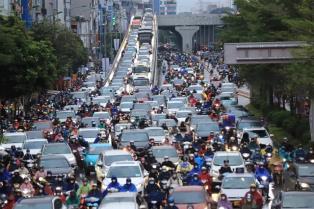Ford Motor Company's Australian subsidiary has announced it is shutting down all manufacturing operations by 2016. What will Viet Nam learn from the lesson?
 |
| The sector should focus on key models with preferential policies including reduction of special consumption tax and registration fees, said the expert. Photo autopro.com.vn |
Ford Motor Company's Australian subsidiary has announced it is shutting down all manufacturing operations by 2016. What will Viet Nam learn from the lesson? Biz Hub introduces an interview between nhipcaudautu.vn and Dr Khuong Quang Dong who has worked in the automobile industry for more than 30 years in France and Japan and contributed ideas to the Viet Nam's draft automobile industry development plan for 2020.
In spite of receiving support from the Australian Government, the Ford Motor Company's Australian subsidiary has finally announced it will shut down car production by 2016. What do you think about this?
Ford Australia has announced it will shut down two factories in the state of Victoria by 2016 after 85 years of operation. This is a disaster for the state and to some extent for the whole country as the closure means sacking about 1,200 workers, threatening 10,000 more jobs in the automobile sectors and 55,000 others in related sectors. This shows that the automobile industry's pervasive impact is very big, affecting the national economy.
In an interview after the news was released, one worker said it was a big shock because he and thousands of other workers will be jobless, leading to severe economic crisis. This shows the current state of the country's automobile industry.
The news has also shocked many other Australians because Ford Australia has received more than $1 billion in public subsidies over the past decade, none of which will be paid back. To maintain operations until 2016, the Australian Government will have to provide a further $25 million.
Can you explain more about the closure?
First, production costs are too high, double that of Europe and four times higher than Asia.
Second, there are too much makes and models.
Third, the import tax is levied at only 5 per cent, while locally-made cars with a prices four times higher than in Asia fail to compete.
Finally, Ford Australia is too weak. It has lost more than $500 million in the past five years.
What is the general state of the world's automobile industry?
The world's automobile industry is in a transitional phase due to many reasons. The market and production units have moved from developed areas to developing areas in an attempt to increase competitiveness. The industry is also slowly moving towards electric cars to stop global warming.
It's not surprising that Ford is going to close its Australian arm and concentrate on manufacturing in Thailand because Southeast Asia is becoming a key global automobile manufacturing centre, and Thailand is an important part of the region.
When Viet Nam fully implements the Asian Free Trade Area in 2018, it will eliminate import duties on all products from ASEAN. At that time, automobile manufacturers may close some assembly plants in Viet Nam.
I think Viet Nam's automobile industry development is similar to Australia's. Production costs are high because 90 per cent of parts are imported, there are too many makes and models, and our factories are small with low productivity.
What did you advise the Ministry of Trade and Industry for its draft plan on Viet Nam's automobile industry development by 2020?
If this situation is remains, many automobile manufacturing factories in Viet Nam will be closed and the industry will go bankrupt.
It's necessary to seek international strategic partners to co-ordinate investing in and building a large-scale assembling and production centre with a capacity of about 100,000 cars per year by 2020 and 300,000-400,000 by 2030. Local production should account for more than 40 per cent in the first stage to boost support industry development. Then the sector should focus on key models with preferential policies including reduction of special consumption tax and registration fees.
Should the country maintain an automobile industry?
The next transition of the world automobile industry will be electric cars. They will be developed and gradually replace cars that run on petrol and diesel. I've already said that Viet Nam should be involved in the race to develop them. Electric cars use simpler technology and are easier to design and manufacture compared to petrol-engine cars.
I think that Viet Nam is capable of producing most of the parts used to make electric cars, except for the Li-ion battery.
Should Viet Nam turn to electric cars?
I think that we should co-ordinate with an international partner to develop the petrol and diesel engine automobile industry because this sector will create many jobs and play an important role in the industrialisation and modernisation process. We should start developing a national electric car industry now in an effort to join the market by 2020. — VNS





